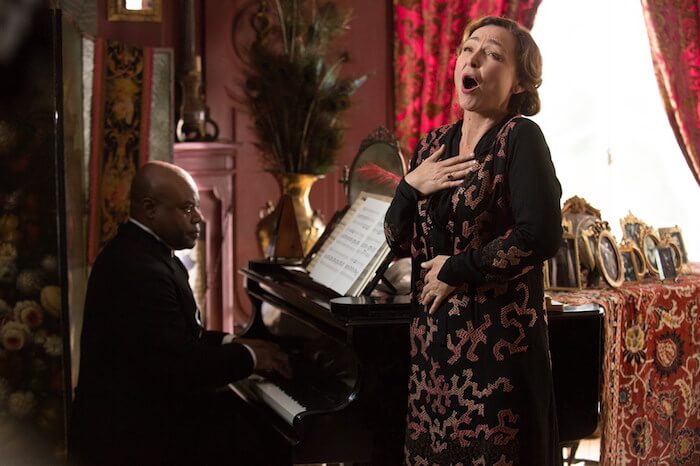The Partly True Story of the Worst Opera Singer in the World: Marguerite


Courtesy of Cohen Media Group
Marguerite
Directed by Xavier Giannoli
Opens March 11
Obliviously terrible opera singer, or victim of an oppressive upper-class society? Both conclusions can be drawn from the tragicomic tale of Marguerite Dumont. Inspired by the story of famously awful American soprano Florence Foster Jenkins (soon to be more directly brought to the screen by director Stephen Frears and star Meryl Streep), Xavier Giannoli’s Marguerite walks a fine line between mockery and empathy in its attempt to be both comedic and dramatic.
Perhaps that having-it-both-ways approach is the only way a story this ridiculous could be told. One can only laugh at how obviously inept Marguerite’s (Catherine Frot) voice is, how utterly lacking in any sense of pitch or rhythm. Even more outrageous, however, are the lengths almost everyone around her are willing to go to shield her from the truth of her incompetence: Her husband, Georges (André Marcon), sabotages his own car to deliberately miss her public performances; their servant, Madelbos (Denis Mpunga), hides newspaper clippings of scathing reviews from her; later, Madelbos blackmails professional opera singer Atos Pezzini (Michel Fau) to give her voice lessons when she decides she wants to give a solo recital. But Giannoli digs deeper into Marguerite and reveals a well-meaning soul who not only genuinely loves music and knows a great performer when she sees one, but views singing as her way of being seen as more than just a socialite with money.
Certainly, as Dumont, Catherine Frot grasps the character’s tragic essence, delivering a performance that poignantly elucidates the yearning inner child behind the self-delusion. Whether the director fully supports Frot’s empathy, however, is more difficult to assess. If nothing else, the fact that Giannoli gives his main character a name that sounds a lot like Marx Brothers foil Margaret Dumont implies a level of condescension that sits uneasily with the gestures toward compassion. And with Giannoli sparing even less understanding for the people around her either coddling her or exploiting her, Marguerite ends up inspiring little more than pity for its central figure, and scorn for just about everyone else.
You might also like 




















